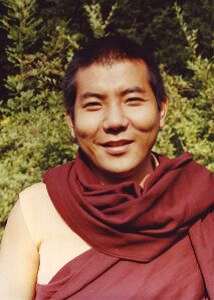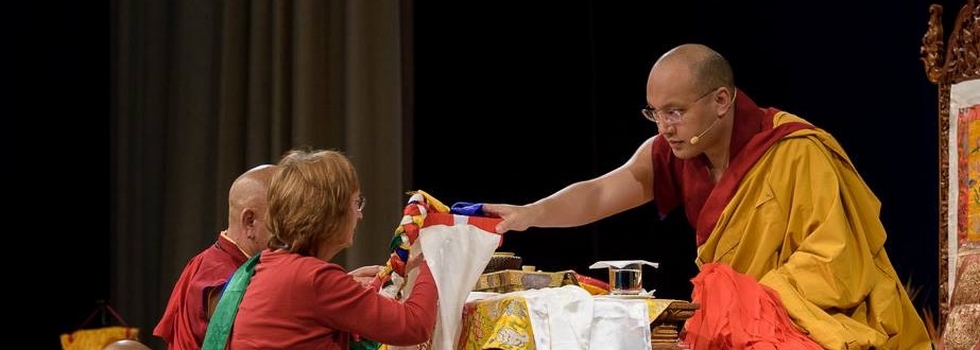An Open Heart and a Clear Mind

His Eminence Jamgon Kongtrul Rinpoche the Third,
Karma Lodrö Chökyi Senge
I would like to greet every one who has come here. I will present a short introduction of the main goal of Buddhism and the methods and means employed to achieve the results.
There are many different kinds of people in the world and therefore a variety of cultures, customs, and religions. Whichever religion or culture one takes into consideration, it is evident that all strive to help sentient beings. Even though all religions share this mutual concern, they teach different approaches and as a result differ with respect to bringing about well-being. A few examples: some religions are based upon the confidence its followers have for it, i.e., the path they think will well-being is based upon belief. Other religions strive for the same aim and encourage their devotees to cultivate analytical reasoning. Buddhism teaches that it is necessary to first acquire a correct philosophical understanding, which is then integrated with in the life of its followers through meditation practices.
If one compares religions, one discovers that they vary with regard to the means they teach to realize the mutual goal that all have in common, namely to experience peace and happiness. If one distinguishes religions by stressing their differences as to belief and their respective advantages or disadvantages, cultural background, and the like, then this is an improper understanding of the religions prevalent in the world.
Many people think Buddhism originated in the East and merely accords with the cultural tradition prevailing there. They think there is no ground for a dialogue between the East and West, between Buddhism and religions alive in other parts of the world. But this is not the case because culture and religion are not the same. A culture can never penetrate a religion, rather religion permeates cultures. Buddhism, for example, originated in the scope of the Indian culture and spread to neighboring territories from there - to Thailand, Japan, and later to Tibet. The prevailing cultures weren't altered, rather Buddhism pervaded the cultural traditions of those countries. Buddhism isn't restricted to a nation which upholds specific customs and habits nor to a country or province and its inhabitants.
The literal translation of the Tibetan word for Buddhism and for a Buddhist is "looking inwards," inwards in contrast to outwards. Buddhism is a practice of inner refinement that can never be acquired through outer means. A Buddhist does not believe that outer things can influence or alter the inner experience of contentment, rather knows that it is necessary to realize who, what, and how one actually is. Since that is the quintessence of Buddhism, one could falsely conclude that all worldly or outer things need to be avoided and shunned. But that is not the case. Westerners falsely assume Buddhism negates the world which only entails suffering. Buddha Shakyamuni never negated the apparent world we perceive and experience. On the contrary, Buddha Shakyamuni showed how the apparent world manifests and how it is experienced when he spoke about the relative truth of reality. He also showed that all relative realities possess an inherent nature inseparably united with appearances and experiences, the ultimate truth of reality. In short, all things appear as relative truths while simultaneously maintaining the ultimate truth. Lord Buddha taught that nothing is by nature retarded or confused. He elaborated how we cling to outer things as true, without realizing that all phenomena and experiences arise in a relationship of interdependence.
Whether one focuses one's attention on attaining personal well-being, on helping others, on achieving comfort in this life, or on acquiring a better future life, one thinks outer phenomena exist dependently and separated from oneself as independent existents and are responsible for fulfilling one's wants and needs. This cannot be, because material objects and momentary situations continually change from happiness to suffering. All things are impermanent and subject to change, because they arise depending upon many causes and conditions. Seeking happiness outside oneself excludes the recipient - oneself. There is no possibility of attaining confidence in oneself by turning one's attention on outer objects. There is no possibility of attaining contentment by turning one's attention on a world separated from oneself, a world subject to change and destruction. Should one think it is possible, one would continue relying on impermanent means to establish lasting joy - a futile attempt.
The Buddha showed the path to lasting and ultimate happiness, which all living beings deep-heartedly want. He taught that one needs to turn one's attention inwards, i.e., one needs to look at one's own mind in order to experience lasting happiness. He showed that this is possible through the practice of meditation. Lasting peace is only an inner experience. The Buddha said that each and every sentient being - whether small or big, whether an insect or a king among kings - is equally endowed with the potential to realize the true nature within. Furthermore, we have no confidence in ourselves nor in others that we all truly have the ability to achieve the final reward of lasting happiness. The problem is, we don't believe so. As a result, we think we need to change the world, which is a grave mistake. We cling to the apparent world, remain involved with it, and in the process lose confidence that it is possible to achieve reliable peace.
Actually, we don't know who we are, what we are, nor what we can achieve. The Buddhist path teaches how to realize one's own nature and does not point to outer distractions. Therefore, Buddhism does not rely on an outer culture. It is also a mistake to think that practicing the Buddhist path of virtue means negating and denying the world.
Renunciation in Buddhism doesn't mean fleeing from reality, for example, by thinking one can renounce the world by breaking the glass on the table. However, the impression of the glass remains alive in one's mind and when needed, one will only buy a new one after one broke the old one. Renunciation has a different connotation. It means understanding the true nature of reality, i.e., realizing apparent experiences are relatively true but are by nature impermanent, are subject to change, and are devoid of independent and inherent existence.
The Buddha therefore said that appearances and experiences in themselves are not distorted or corrupted, rather confusion and the delusions that arise from clinging to them as real and therefore seeing them as being responsible for the happiness and suffering in our lives is wrong. We fail to realize the true nature of reality and differentiate between good and bad, pleasant and unpleasant feelings. We fail to recognize that it is due to our attachment and aversion for and against relative reality that suffering is experienced and that the objects in themselves are not responsible.
The relative truth of experiences is the basis for all meditation practices that Buddha Shakvamuni taught. Meditation engenders awareness and conscientiousness in all situations of everyday life and at all times. Awareness relates to all activities of body, speech, and mind - it permeates all we are and everything we do.
Many people think meditation is exceptional and cannot be integrated in daily life. This is not the case at all. We need to understand the importance of meditation practice and know its purpose. If we look at our mind in our present state, we only have short glimpses of its true nature. Awareness that arises from correct meditation practice penetrates our lives and determines our activities, consequently our experiences.
In short, as long as one cannot control one's own mind, worldly distractions experienced through perception overwhelm and control our mind and our lives, which can never lead to lasting joy. As long as one has no control over one's mind, no religion can guarantee lasting happiness. Therefore, the Buddha taught it is of utmost importance to first learn to train and control one's own mind.
Buddha Shakyamuni showed the nature of the mind and the nature of all things. Buddhism means understanding the teachings Lord Buddha imparted.
Questions & Answers
Question: Is television bad?
Rinpoche: No, it only distracts.
Question: How does reincarnation take place?
Rinpoche: If we look at our present body that consists of blood and bones, we recognize that it is impermanent. If we look at our mind, we recognize that it is non-substantial and is impermanent. The mind utilizes the body for a while. The mind has two aspects: it is devoid of substantiality and is unimpeded awareness. We fail to recognize mind's aspects and differentiate between an apprehending self, experience apprehended other things, and act accordingly; each activity entails experiences that become impressions, which are stored in the mind as habits that, in turn, determine our future life and rebirth.
Question: What do you mean by saying there are different approaches to religions?
Rinpoche: Although the aim of all religions is the same, the means to bring this about depends upon the individuals, who are different from each other. People have different propensities and inclinations, therefore there are different means. In Buddhism, too, there isn't one type or meditation practice but many, in order to meet the various aptitudes individuals have, which must be taken into consideration.
Question: Can one practice meditation without relying on instructions from a teacher?
Rinpoche: It's good to rely upon a qualified teacher, because one needs the lineage transmission of each practice. A teacher instructs and inspires a student. A practitioner makes many experiences in meditation and needs advice on how to deal with them. If he cannot consult a teacher, he may err.
Question: How do you deal with mourning in Buddhism?
Rinpoche: There are two aspects to the instructions: ultimately, nobody dies and therefore there is no suffering, the profound view. Buddhism teaches that relatively all compounded phenomena eventually cease; where there is birth, there is death. Meditating on impermanence helps and applies to us.
Question: Would you please describe the astral body and whether karma determines it?
Rinpoche: Many types of form bodies are described in Buddhism. Attaining a human body means karma has ripened. There are various types of karma and therefore it is continuous. Karma isn't a singular entity.
Question: What is the difference between the Buddhist and Christian practices?
Rinpoche: I attended a few conferences on Buddhism and Christianity and saw the difference is in the philosophy. In Buddhism, the view is free of extreme mental suppositions that say we must believe phenomena either exist or do not exist. The view of Buddhism teaches that all things arise in dependence upon causes and conditions and are an expression of the mind. The path of Buddhism and Christianity are similar because brotherly love is emphasized in both the great vehicle of Mahayana and in Christianity.

Dedication
Through this goodness, may omniscience be attained
And thereby may every enemy (mental defilement) be overcome.
May beings be liberated from the ocean of samsara
That is troubled by waves of birth, old age, sickness, and death.
May the life of the Glorious Lama remain steadfast and firm.
May peace and happiness fully arise for beings as limitless (in number) as space (is vast in its extent).
Having accumulated merit and purified negativities, may I and all living beings without exception swiftly establish the levels and grounds of Buddhahood.
Presented at the Congress Hall in Vienna, Austria, 1987. Translated and edited by Gaby Hollmann in 1987. Arranged for the website of Karma Chang Chub Choeling in Heidelberg with sincere gratitude to Hans Billing, our webmaster, by Gaby Hollmann, Losar, 2008. Copyright Jamgon Kongtrul Labrang, Pullahari, Nepal, 2008.















